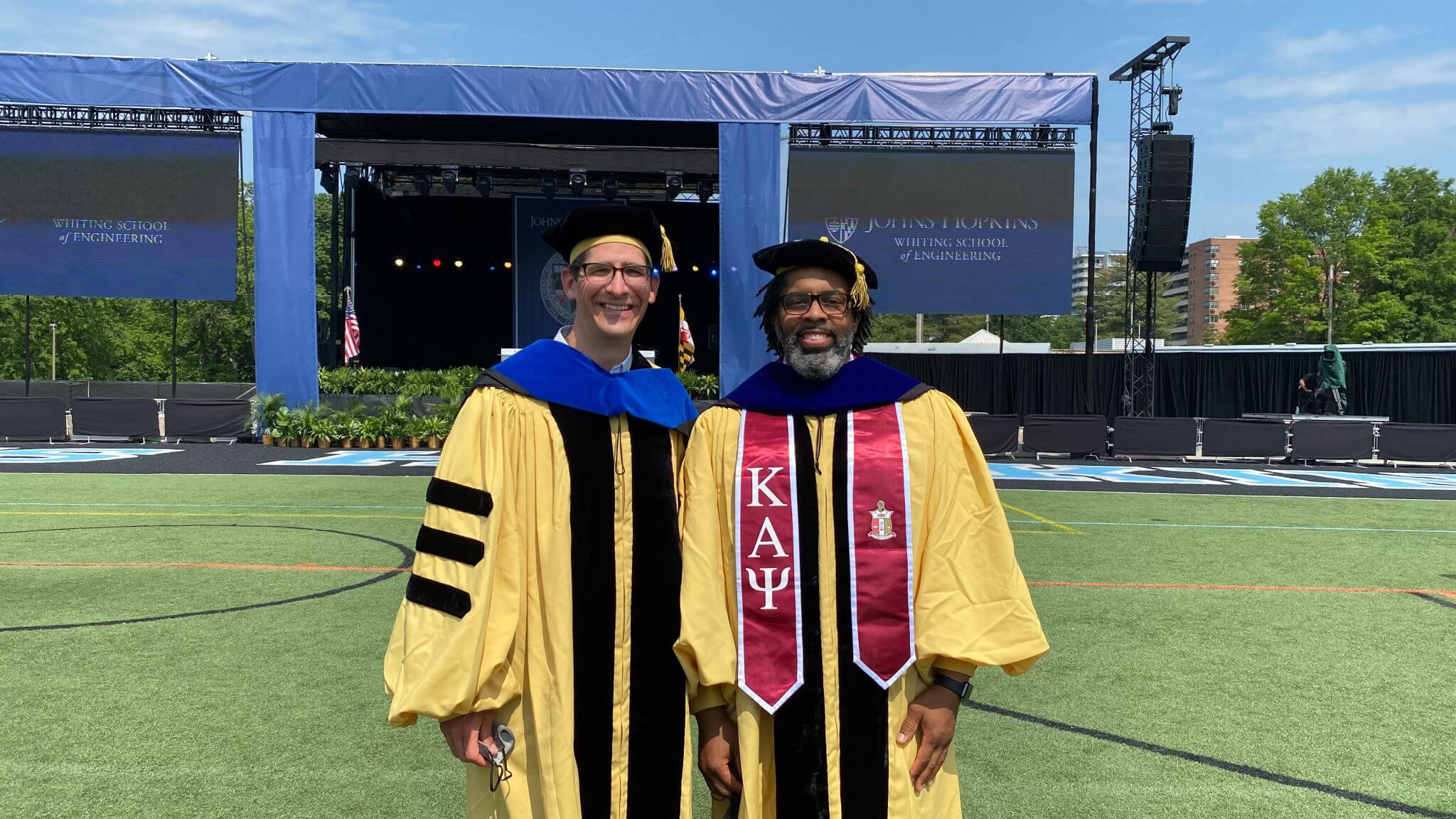News
First Doctorate of Engineering Class Includes Four Johns Hopkins APL Grads
On a warm, sunny day at the end of May, the sounds of “Pomp and Circumstance” floated across Johns Hopkins University’s Homewood Field. Graduates of the Whiting School of Engineering’s doctoral programs listened quietly to the music while wearing their academic regalia and JHU-branded face masks. To anyone passing by, the ceremony probably seemed like one of many others that take place on campus every year.
But sitting among the crowd, Bart Paulhamus knew this ceremony was a bit different — and it wasn’t just because of his Intelligent Systems Center (ISC)-branded mask. Paulhamus, chief of the Johns Hopkins Applied Physics Laboratory’s (APL) ISC, was one of the first four APL staff members to graduate from the new doctor of engineering program, along with Myron Brown, Jeffrey Chavis and Peter Thielen.
The graduation of the first cohort of Johns Hopkins APL staff members was an important moment for continuing education at the Laboratory. The doctor of engineering (D.Eng.) program, which is intended for mid-career individuals who work full-time, was designed in a collaboration between APL and JHU and piloted solely with the Laboratory. The program differs from a traditional doctorate program in that it centers around practice and application, rather than on career preparation in academia or research. The fact that the program allows for such a focus on hands-on learning means that staff members who participate can continue to work on sponsor-facing research throughout their studies.
Chavis, a chief engineer in the Asymmetric Operations Sector (AOS), explained that for the D.Eng. program, the idea is that students come in working on technical projects and soon get authorization to use that work toward their degrees. ”Because of that, we have all been able to really personalize our areas of study based on the work we do at APL. Everything is personalized based on each student’s interests, which means that everyone’s experiences looked different,” he said.
And while the new graduates needed just three years to obtain their D.Eng. — rather than the typical five years — the program is still considered academically rigorous. All students are required to enter it with a master’s degree, which is not typically required for a Ph.D. program. In this three-year time span, the students spent their first year working on classwork while beginning research for their dissertation. Years two and three were then spent on the creation of the dissertation, with APL staff members focusing on how their efforts can help the Lab continue its important work, for sponsors and the nation.
“When I applied, I realized that, had I been pursuing a traditional Ph.D. program, a lot in my life would have had to change,” said Thielen, a project manager and molecular biologist in the Research and Exploratory Development Department. “But the D.Eng. program helped me to continue on the APL work I really care about. And integrating that work into a doctoral program, as well as working closely with a mentor, gave me a lot of opportunities that allowed me to further myself as a professional.”
For the D.Eng., the graduates participated in APL’s Part-Time Study Program, which provided financial assistance and paid leave. Once the staff members entered the dissertation phase of the program, they were able to use 200 hours per calendar year — almost 10% of a staff member’s work time — to perform their research and development. They could use that time to write, submit papers, or even use laboratory equipment to perform experiments.
“The timing worked great for me because I had a sponsor that was very supportive of doing research approved for public release,” said Brown, a section supervisor in AOS. “I was able to spend a lot of technical time on the project, which is something I may not have done if I were not in the program.”
Common themes in the participants’ experiences include supportive advisors for each student from both JHU and APL, as well as the ability to continue working on their everyday research, which was how the program was envisioned from the outset. Now that their time in the D.Eng. is complete, all four graduates agree that the program was worth the time and effort.
“My advice for anyone interested is to not take this program lightly,” said Paulhamus. “This program is not a sprint — it’s a marathon. This is a three-year program; it doesn’t let up. But it is very much what you make of it and I am glad to have participated.”
“I would 100% do this again, despite all of the challenges of getting a doctorate in three years during a pandemic,” said Thielen. “The program made challenges like that worth it. And I’m glad to have checked it off my list of life goals that have been completed.”
APL encourages a culture of lifelong learning and discovery, and D.Eng. is one of several higher education programs at the Laboratory. Learn more about education assistance and other APL benefits at jhuapl.edu/careers.
